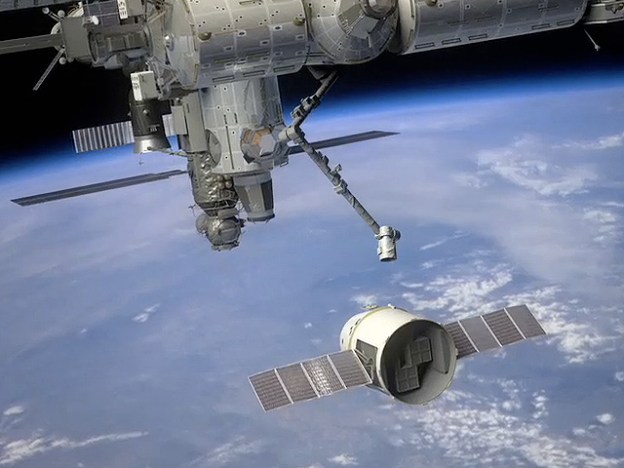 It’s going to be a while before we can buy our own tickets to space, but plans for getting cargo up to the International Space Station via private spaceflight companies appear to be ahead of schedule.
It’s going to be a while before we can buy our own tickets to space, but plans for getting cargo up to the International Space Station via private spaceflight companies appear to be ahead of schedule.
According to The Wall Street Journal, the U.S. space agency approved a mission to the ISS by private spacecraft developer Space Exploration Technology Corp. (SpaceX) by the end of the year — several months earlier than initially anticipated. If all goes as planned, the company’s Dragon Capsule (shown in the above illustration) will dock with the ISS in late November, marking NASA’s first major use of private-sector space travel after ending the space shuttle program earlier this year.
SpaceX is one of seven private companies recently awarded contracts for space-travel initiatives. The two-year contracts total $10 million in funding for the companies, and are part of NASA’s Flight Opportunities Program.
Also among the companies is Armadillo Aerospace, an aerospace start-up founded by Id Software (developers of Doom and Quake) co-founder John Carmack, as well as Virgin Galactic, who plans to fly up to eight passengers (including two pilots pilots) to the edge of space on its SpaceShipTwo commercial space plane.
Virgin has already sold hundreds of tickets for upcoming flights on SpaceShipTwo, which will carry space tourists as well as research payloads.
Photo courtesy of NASA.
Editors' Recommendations
- Watch SpaceX practice an emergency escape from its Crew Dragon capsule
- How to watch the SpaceX Dragon spacecraft depart the ISS today
- Problem in parachute test forced SpaceX to drop its mock spacecraft
- SpaceX and NASA still set for historic May mission despite coronavirus
- How to keep astronauts sane: The psychology of long-duration space missions




